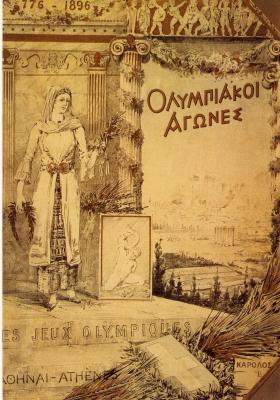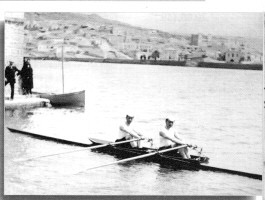Rowing has been staged at every Olympics except the first Games in 1896. In the results section of the ‘1896 Official Report of the Games of the First Olympiad’ there is one line for rowing: “No rowing events could be held due to adverse weather conditions.”
In keeping with the rise of organised competitive sport, which had evolved and developed in the late 19th century throughout the western world, these inaugural Olympic Games in Athens included a wide-range of events.
The Games, spread over ten days, included athletics (track and field), cycling (“the chariot-racing of the modern era”), fencing, gymnastics, sailing, shooting, swimming, tennis, weightlifting, and rowing.
The swimming events were held on the sixth day. There was no ‘swimming pool as such, so the Bay of Zea, “picturesquely surrounded by the most pleasant part of the city, constitutes a shallow and calm haven, communicating with the seas by the narrow entrance”.
Unfortunately, there was no such ‘haven’ for the rowing events, which were to be held on the eighth day (April 1, 1896) at Phaleron Bay.
The morning races were to be for sculling and pairs over 2,000m, and fours with rudders over 4,000m. The afternoon events, all over a distance of 2 miles, were for ‘whaling boats’, and ‘outriggers of 16-20 oars, and 10-14 oars’. The ‘Boat Races are described in the “Official Report”:
… Considerable crowds continually came down by the railway and the tram and took up positions on the special jetties. The wind, however, continually strengthened and the contestants were hesitant in coming forward.
In spite of this it was decided that only the four-oared boat contests should take place, and they were transported to Old Phaleron, drawn by steam launches, to the starting point which is marked by the boats of the Syra Rowing Club and that of the Panhellenic Club of Athens.
The bad weather, however, turned the sea rough making their rowing impossible. Owing to this, the contest was postponed until 3 p.m. Yet as the bad weather continued up to then, indeed with greater violence, and the boats and barges were swept ashore, the contests both of rowing and the naval boats were definitely cancelled.
However, were there really no competitions held? Possibly, the only photograph of rowing in Athens in 1896 is from German photographer Albert Meyer, which shows the German pair Alfred Jaeger and Berthold Küttner from the Academic Rowing Club, probably during training in Piraeus. Years later – 1936 – Küttner wrote:
Finally, our day had come! … The double scull would be the first to start because the wind had become much stronger. On a fishing boat we took our double scull to the starting line. We already had problems getting into the double scull because of the swells. … no [opponents] had appeared—although both Greeks and Italians had applied. Because a longer wait for them seemed pointless, the starter told us to sail without competition.
Küttner claimed they were the winners; but this is still not acknowledged.
Of course, at the 2032 Olympic Games, when (to be positive!) Coastal Rowing is held on Noosa’s Laguna Bay (Main Beach), one of the few north-facing beaches on the coast line of Australia, no such cancellation will occur.
The Melbourne Argus reported that the Victorian Rowing Association meeting of October 14, 1895 had received the following: ‘A programme of the Olympic games to be held at Athens in April 1896, was received, with an invitation for the Association to compete in the rowing events’. No Australian rowers were present.
It will be fantastic if we are there in 2032, and what a splendid Olympic event that will be.
(Dr Ian Jobling is Honorary Director of the University of Queensland Centre of Olympic Studies)








